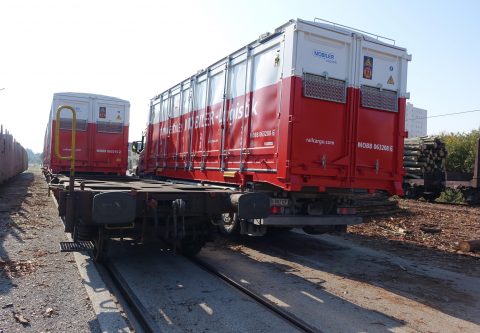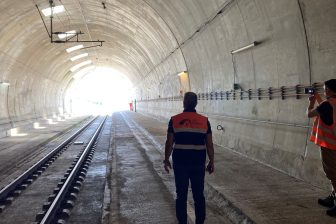
Terminal-free transport from factory to train
Austria’s Rail Cargo Group (RCG) has successfully led a test event designed to get products faster from factory to train without the need for a dedicated goods terminal. RCG, the goods division of ÖBB, is working with engineers Fritsch, Chiari & Partner ZT on the project, which enables a single individual to operate a specialist goods shifting system.
With the ever-growing number of container transports both in Austria and further afield, all partners are looking to stay ahead by finding solutions for rapid handling of cargoes from HGV to rail. Austria’s Southern Burgenland region is one area that has seen a sharp increase in goods transportation by rail since 2013.
Profitability
The Combi Coop II project is operated under the leadership of FCP, utilising the Rail Cargo Group’s MOBILER system, and it is within this context that the Southern Burgenland area has been examining the profitability of specific transportation cases using state-of-the-art combined transport systems. Combi Coop II is designed specifically to demonstrate to companies without their own rail connection the benefits of combined transport by rail, namely cost and the environmental impact. The project makes an active contribution to the railway campaign in this area, particularly regarding the shifting of goods transports from road to rail, and can act as a model for other regions.
Thanks to the special container movement system enabled by MOBILER technology, containers can be quickly transferred between HGVs and railway wagons, almost anywhere and with the minimum disruption to the logistical chain. One person can use a special hydraulic lift and feed service, without the need for extra assistance or expensive terminal equipment. What makes this system particularly innovative is that it can be done at virtually any railway station with an appropriate loading siding and team track.
Test run
Test deployment of the MOBILER system took place in the Rechnitz/Oberwart district of Burgenland, on behalf of the waste disposal company Stipits Enstorgung GmbH. MOBILER HGVs brought several containers directly to the waste disposal company, where containers were loaded with waste paper and cardboard boxes. The HGVs then drove the short distance to Oberwart railway station and transferred the containers onto the railway in a matter of minutes. Following the successful test run, further test transports are planned using MOBILER technology.
Additionally, the fast and versatile container movement system of RCG should in future continue to be used in the region, as the test transport impressively demonstrated how companies can benefit from additional capabilities regarding the transportation of goods by rail through efficient container handling. A further eight companies will be involved in the project, which is funded by the Austria Economic Service, part of the Austrian Ministry for Traffic, Innovation and Technology.
Logistics training course
RCG meanwhile is again offering a training course for certified logistics administrators, providing personalised training and an advanced module focusing on transport and logistics in an international context, which is unique in Austria. This is the fourth such course, and for the first time this year participants from Austria, Germany and Hungary will be taking part in the international training. The course takes place over two semesters on a part-time basis, and examines future issues with a customer focus and develops them into business models. Training concludes with a thesis, where participants take an in-depth look at their ideas and projects.
RCG’s ethos is to use ‘blended learning’ during the training, as it allows for greater flexibility. This type of integrated learning capitalises on a meaningful linking of traditional attendance events and modern forms of e-learning. A total of 17 participants of all ages and departments as well as different training grades and functions experience cross-functional co-operation in this way.





